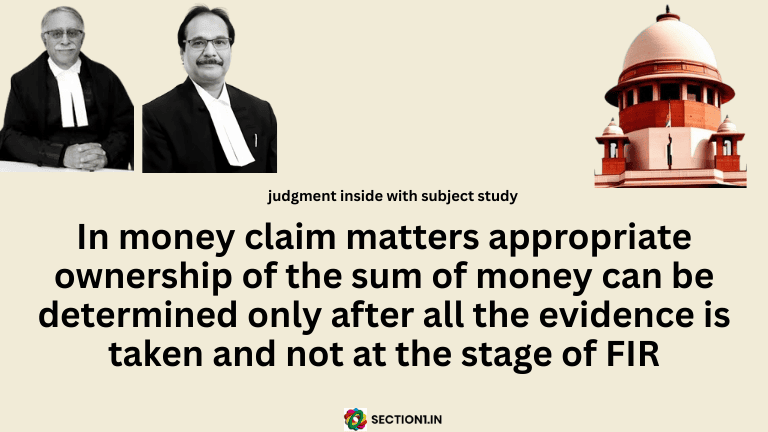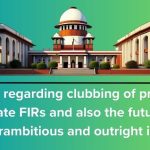Appeal against the disposal of case property in connection with FIR
2. The appellant-accused has challenged a judgment passed by the learned Single Judge of the High Court of Gujarat at Ahmedabad in R/Special Criminal Application (Quashing) No. 1955 of 2024, dated 4th December 2024 whereby release of case property (cash) in connection with First Information Report being CR No. 11206078220159 of 2022 was allowed by the Court. The said application before the High Court was preferred against orders dated 1st August 2023 and 30th December 2023 passed by the Additional Chief Judicial Magistrate of Unjha, in Criminal Case No. 366 of 2022 and by the Additional Sessions Judge, Mahesana Visnagar, respectively.
Facts
3. The facts, leading up to the impugned judgment, as can be understood from the judgments of the Courts below are that one Chiragkumar Dilipbhai Natwarlal Modi, lodged a complaint before the PS Unava, District Mahesana on 9th April 2022 alleging that the appellant-accused ran a proprietary firm by the name of Jay Gopal Trading Company and had conducted business with the complainant worth Rs. 44,53,714/- in castor seeds on different dates and various cheques given in respect of this amount were returned due to insufficient balance. It was also alleged that the said Company had done business with other concerns totalling Rs.3,49,07,073/- (including the payment of the complainant) and had similarly not paid the amounts due. The police completed its investigation and presented chargesheet on 5 June 2022 under Sections 406, 420 and 120-B Indian Penal Code, 1860. Therein, in support of its case the State listed a total of 41 witnesses and respondent no. 2 herein / the petitioner before the High Court was listed at serial no. 4 in the said list.
Respondent no.2’s petition for disposal of property was dismissed by Magistrate court
4. Respondent No. 2 filed an application before the Additional Chief Judicial Magistrate, Unjha in Criminal Case No. 366 of 2022 seeking release of ‘muddamal’ i.e., cash amount of Rs. 50,00,000 was seized during the investigation, on the ground that the said amount pertained to him for the goods he had sold through his concern namely Bhadrakali Tobacco to the Company of the appellant-accused and in that regard he has produced a copy of the bill, the audit report and ledger account. The learned Trial Judge, however, refused such prayer observing as follows:
“… on perusing the charge-sheet, it appears at the present stage that in allegation against the accused of this case is that of committing cheating and breach of trust with the complainant and the witnesses stated in the charge-sheet and in that when objection of all the witnesses are not obtained on behalf of the applicant, then in that case, when the case proceedings are pending and it has become a matter of evidence as to whom the muddamal be handed over at this stage and hence, it does not appear to be proper and just to take any decision regarding muddamal…”
Additional sessions judge in revision has confirmed the order
5. In an appeal filed under Section 397 of the Code of Criminal Procedure, the Additional Sessions Judge, Mahesana at Visnagar confirmed that the order of the court below observing:
“ ……………… “
Hon’ble High Court has granted the disposal of property in a writ application
6. The respondent no. 2 then preferred a petition before the High Court under Articles 226 and 227 of the Constitution of India against these orders. Taking a view opposite from the one taken by the Courts below, the High Court reasoned as follows:
“………….”
7. Aggrieved by this order, the appellant-accused is before us. We have heard the learned counsel for the parties.
Analysis
Section 451 Cr.P.C
8. At the outset, we may reproduce Section 451 of the Code of Criminal Procedure, 1973 which forms part of Chapter XXXIV titled ‘Disposal of Property’ for reference:
“451. Order for custody and disposal of property pending trial in certain cases.—When any property is produced before any Criminal Court during any inquiry or trial, the Court may make such order as it thinks fit for the proper custody of such property pending the conclusion of the inquiry or trial, and, if the property is subject to speedy and natural decay, or if it is otherwise expedient so to do, the Court may, after recording such evidence as it thinks necessary, order it to be sold or otherwise disposed of.
Explanation.— For the purposes of this section, “property” includes—
(a) property of any kind or document which is produced before the Court or which is in its custody;
(b) any property regarding which an offence appears to have been committed or which appears to have been used for the commission of any offence.
Sunderbhai Ambalal Desai vs. State of Gujarat judgment analysis
9. This Court in Sunderbhai Ambalal Desai v. State of Gujarat [(2002) 10 SCC 283], while dealing with Section 451 of the Code held thus:
“Valuable articles and currency notes
11. With regard to valuable articles, such as, golden or silver ornaments or articles studded with precious stones, it is submitted that it is of no use to keep such articles in police custody for years till the trial is over. In our view, this submission requires to be accepted. In such cases, the Magistrate should pass appropriate orders as contemplated under Section 451 CrPC at the earliest.
This extract is taken from Sunderbhai Ambalal Desai v. State of Gujarat, (2002) 10 SCC 283 : 2003 SCC (Cri) 1943 : 2002 SCC OnLine SC 934 at page 288
12. For this purpose, if material on record indicates that such articles belong to the complainant at whose house theft, robbery or dacoity has taken place, then seized articles be handed over to the complainant after:
(1) preparing detailed proper panchnama of such articles;
(2) taking photographs of such articles and a bond that such articles would be produced if required at the time of trial; and
(3) after taking proper security.
13. For this purpose, the court may follow the procedure of recording such evidence, as it thinks necessary, as provided under Section 451 CrPC. The bond and security should be taken so as to prevent the evidence being lost, altered or destroyed. The court should see that photographs of such articles are attested or countersigned by the complainant, accused as well as by the person to whom the custody is handed over. Still however, it would be the function of the court under Section 451 CrPC to impose any other appropriate condition.
14. In case, where such articles are not handed over either to the complainant or to the person from whom such articles are seized or to its claimant, then the court may direct that such articles be kept in bank lockers. Similarly, if articles are required to be kept in police custody, it would be open to the SHO after preparing proper panchnama to keep such articles in a bank locker. In any case, such articles should be produced before the Magistrate within a week of their seizure. If required, the court may direct that such articles be handed back to the investigating officer for further investigation and identification. However, in no set of circumstances, the investigating officer should keep such articles in custody for a longer period for the purposes of investigation and identification. For currency notes, similar procedure can be followed.”
Trial and District courts have taken correct view
10. The High Court has correctly referred to this judgment, however, in our considered view failed to appreciate its holding in the attending facts and circumstances of the instant case. We say so for the reason that the money in question was recovered as part of an investigation in which the exchange of money is the subject matter of controversy. As we have already noted supra, the dispute pertains to money paid to the complainant and other like firms, in the course of business. It is undisputed that respondent no. 2 has produced before the High Court certain documents to show that the proprietary firm through the appellant-accused, owed him/his concern a sum of Rs.50,00,000/-. However, it is entirely possible that the said sum of money was part of some other transaction. Simply because the amount owed to him matches the amount recovered does not establish that he is the only claimant to the said amount. As such, we hold that the Additional District and Sessions Judge, Mehsana correctly took the view that the direct ownership of the said Respondent cannot be conclusively established.
Ownership of the sum of money can be determined only at the end of trial
11. The appropriate ownership of the sum of money can only be determined after consideration of all evidence and having taken into account the claims and views of all the other persons that the appellant-accused has allegedly played foul with, in business. The evidence presented by respondent no. 2 to establish his claim over the said amount will have to be considered by the Court seized of trial in the matter, and then only can a proper decision be arrived at. At this stage, therefore, releasing the muddamal would be unjustified and premature.
12. In that view of the matter, the appeal is allowed. The judgment of the High Court with particulars as mentioned in paragraph 1 is set aside and the judgment and orders of the Courts below are restored.
Party
Rajput Vijaysinh Natwarsinh vs. State of Gujarat & Ors - Criminal Appeal No. 4129 of 2025 (Arising out of SLP(Criminal) No.3179 of 2025) - September 18, 2025 - 2025 INSC 1129 – Hon’ble Mr. Justice Sanjay Karol and Hon’ble Mr. Justice Prashant Kumar Mishra.





